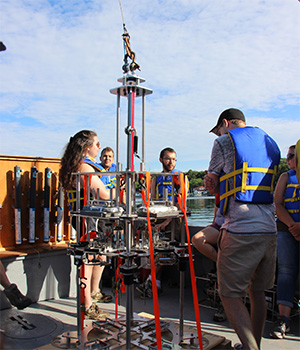A group of eight students from seven different universities in Israel travelled over 8,000 km to Halifax to learn more about the North Atlantic Ocean.
Through the Schulich Ocean Studies Centre Initiative – a partnership between Dalhousie and the Interuniversity Institute for Marine Studies in Eilat (Israel) – the students were able to spend three weeks on exchange at Dalhousie and take a field course that will count as a full credit toward their degrees.
Helping to make this initiative possible is Seymour Schulich. Funding provided by Mr. Schulich, a Canadian philanthropist and also the namesake of Dal's law school, also supports joint research projects, thematic conferences and more.
International connections
Introduction to Field Oceanography, part of Dalhousie’s SEASIDE program, explores the relationships between living organisms in the sea and the ocean environment. It’s an intensive six-day-a-week course, where students spend their time in lectures and conduct field research on fishing boats in the Halifax Harbour, Bedford Basin and beyond. They study alongside Dalhousie students, including some who went on exchange to Israel in December 2015.
 For Noa Leibovich, a computer science and geography student from Tel Aviv University, studying at Dalhousie provided an opportunity to learn more about oceanography, a field of study that had always been of interest. While in Halifax, Noa was able to spend time testing sediments on the bottom of Halifax Harbour and research the effects of pollution.
For Noa Leibovich, a computer science and geography student from Tel Aviv University, studying at Dalhousie provided an opportunity to learn more about oceanography, a field of study that had always been of interest. While in Halifax, Noa was able to spend time testing sediments on the bottom of Halifax Harbour and research the effects of pollution.
“Everything we studied taught me something I didn’t know – starting with the ship we sailed on, to the instruments we used to measure, to classes about marine life in the Bedford Basin,” says Leibovich. “Visiting a place that is leading in its field of research is truly inspiring and motivating.”
Tamir Shay, a geology and education student at the Hebrew University of Jerusalem, had the opportunity to analyze research data and compare it to data taken from the monitoring station located in the Bedford Basin.
“I learned about different field research methods in oceanography, a subject I never got to learn back home,” says Shay. “I was interested to see what oceanography studies would look like in a city like Halifax, compared to Jerusalem, which has no sea.”
An exciting opportunity
Students are selected for the field course exchange based largely on their academic records, and the selection is highly competitive. This year, there were a total of 50 applications to participate in the summer program.
“Working with these students is very rewarding,” says Catherine MacNeil, Schulich Ocean Studies Centre Initiative project coordinator. “We’re offering an opportunity for Dalhousie and Israeli students to travel and learn in environments that would otherwise be unavailable to them.”
In December, eight students from Dalhousie will have the opportunity to travel to Israel and study the ecosystem of the Gulf of Eilat. This area is home to unparalleled marine systems of great interest to ocean scientists all over the world.
“The Schulich Ocean Studies Initiative has allowed the Faculty of Science to offer a unique scientific and cultural experience to our Marine Biology and Ocean Science students,” says Sandra Walde, associate dean academic with the Faculty of Science. “We — and our students — are very grateful to Mr. Schulich for his generosity.”
“I feel very lucky to be here, and it is all thanks to Mr. Schulich, “says Noa. “I know I have learned a lot from this experience.”

